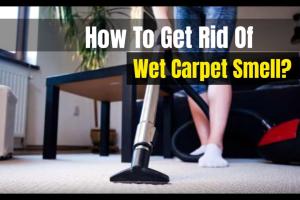Eliminate Wet Carpet Smell: A Complete Guide to Freshen Your Home

-
Quick Links:
- Understanding Wet Carpet Smell
- Common Causes of Wet Carpet Smell
- DIY Solutions to Remove Wet Carpet Smell
- When to Call Professionals
- Preventive Measures for Future Odor
- Real-World Case Studies
- Expert Insights on Carpet Care
- FAQs
Understanding Wet Carpet Smell
Wet carpet smell is often a sign of trapped moisture, which can lead to mold and mildew growth. Understanding the science behind these odors is crucial for effective remediation. When carpets absorb moisture, they can emit a musty smell, primarily due to the breakdown of organic materials and bacteria's action in damp environments.
Common Causes of Wet Carpet Smell
Several factors can contribute to the unpleasant odor of wet carpets:
- Flooding: Water damage from natural disasters or plumbing issues.
- Improper Drying: Inadequate drying after cleaning or spills.
- Mold Growth: Moist environments are breeding grounds for mold and mildew.
- Pet Accidents: Urine and other pet-related issues can create lingering smells.
DIY Solutions to Remove Wet Carpet Smell
Before seeking professional help, you can try several DIY methods to eliminate wet carpet smell:
1. Baking Soda
Baking soda is a natural deodorizer. Sprinkle a generous amount on the affected area, let it sit for at least 30 minutes, and then vacuum it up.
2. Vinegar Solution
A mixture of equal parts white vinegar and water can neutralize odors. Spray it lightly on the carpet and blot with a clean cloth.
3. Essential Oils
Mix a few drops of essential oils with water in a spray bottle. Lavender, tea tree, and lemon oils are great for freshening up your carpets.
4. Steam Cleaning
If accessible, using a steam cleaner can help remove the smell by deep cleaning the fibers of the carpet.
5. Dehumidifiers
Using a dehumidifier can significantly reduce moisture levels in the air, helping to dry out carpets and eliminate odors.
When to Call Professionals
If DIY methods fail, it may be time to call in the professionals. Here are some situations where expert cleaning is necessary:
- Severe flooding damage.
- Persistent odors after multiple cleaning attempts.
- Mold growth that is visible or suspected.
Preventive Measures for Future Odor
To avoid the recurrence of wet carpet smell, implement the following preventive measures:
- Ensure proper ventilation in rooms with carpets.
- Use mats and rugs to minimize moisture exposure.
- Regularly clean carpets and treat spills immediately.
Real-World Case Studies
Here are a couple of case studies illustrating how various homeowners tackled wet carpet smell:
Case Study 1: After a Flood
After a significant flood, Jane from Ohio faced severe wet carpet smell. She used a combination of baking soda and professional steam cleaning, ultimately restoring her carpet's freshness.
Case Study 2: Pet Odors
Mark in California struggled with pet odors. He found that a vinegar solution followed by professional cleaning effectively eliminated the smell.
Expert Insights on Carpet Care
We spoke with carpet cleaning experts who emphasized the importance of immediate action when dealing with wet carpets:
"The quicker you address moisture issues, the better your chances of preventing permanent damage and odors." - John Doe, Carpet Cleaning Specialist
FAQs
1. How long does it take for wet carpet smell to go away?
It can take anywhere from a few days to weeks, depending on the extent of the moisture and cleaning methods used.
2. Can wet carpet smell cause health issues?
Yes, mold and mildew can lead to respiratory problems and allergies.
3. Is it safe to use bleach on carpets?
No, bleach can damage carpet fibers and is not recommended for cleaning carpets.
4. How often should I clean my carpets?
Carpets should be cleaned at least once a year, more often in high-traffic areas.
5. What if I can't get rid of the smell?
If the smell persists, consider hiring a professional carpet cleaning service.
6. Can I use a hairdryer to dry wet carpets?
Using a hairdryer is not recommended as it can overheat and damage the carpet fibers.
7. Should I replace my carpet if it smells?
Replace the carpet only if cleaning attempts fail and mold is present.
8. How do I know if mold is growing in my carpet?
Look for discoloration, a musty smell, or visible spores.
9. Can I use commercial odor removers?
Yes, there are many commercial products specifically designed for odor removal in carpets.
10. What are the best practices for carpet drying?
Use fans, dehumidifiers, and ensure proper ventilation for effective drying.